Kyle Dubas joined Prime Time Sports and TSN Overdrive on Tuesday evening, discussing the acquisition of Tyson Barrie and Alex Kerfoot in exchange for Nazem Kadri, the Mitch Marner negotiations, the addition of Cody Ceci, the team’s grit level, and much more.
Notably, Dubas seems to hint at one point in the interview that Cody Ceci has an arbitration hearing later in the summer, suggesting that perhaps the $4.5 million one-year contract has not been agreed upon as previously reported.
We feel he’s got a lot of incentive. He’s got an arbitration case ahead of him and one year before he hits free agency. We are excited about working with him and trying to make some gains with him.
Also of note is Dubas mentioning Muzzin and Barrie as a defense pairing that’s played together at the World Championships, how much they think Barrie has improved on his defensive game, and that the team might look at some different options at 3C, be it Jason Spezza or possibly William Nylander. Speaking of the Sebastian Aho offer sheet and the Timo Meier contracts, both of which came in at reasonable figures, Dubas hinted he’s hopeful it will “shake things loose” on the Marner front.
On the Tyson Barrie acquisition and the departure of Nazem Kadri
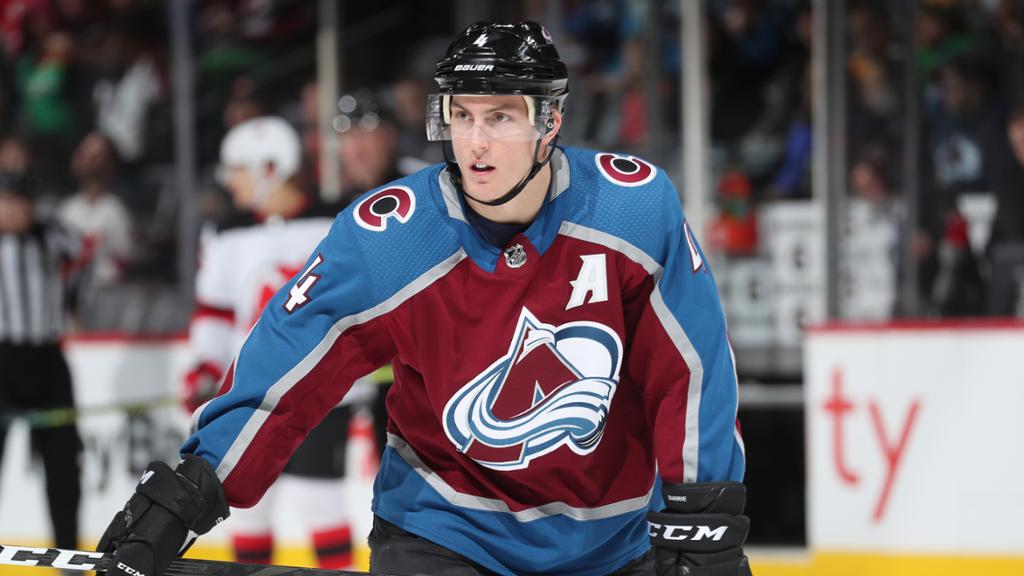
The Kadri deal — how long was that in the works? Was it at all a revisitation of something that had been talked about last year or last offseason or during the season, or is this something that really just kind of came up after the end of the season?
Dubas: No, there weren’t really any discussions last summer at all. From the end of the season until signing John Tavares, we didn’t really have the depth at the position to be able to even contemplate potentially moving him because of how important of a player he was for us and certainly was at that time. At the end of this year, I think teams… In early May, we started to have some interesting calls with different teams.
It was never our intention to trade Naz. It just became something where, as we went through our options and went through every team, we kind of knew that we were going to have to give something up to address our needs on the backend. We were trying to find a trade partner where everyone could come out on the winning end of it, where a team could address their need for a top-end, proven center and we could get a center back — hopefully someone younger who is a little bit cheaper that we could plug into our lineup and replace Naz. And the biggest need for us, of course, was on D.
There were a few clubs that were good matches for us. Once the Zaitsev, Connor Brown, Cody Ceci and Ben Harpur situation was settled, you really started to focus on it and it really kind of became something we worked very hard on the last six days before July 1st.
How would you compare Tyson Barrie to Morgan Rielly? People have made that comparison and said he’s kind of a Western Conference version of Morgan Rielly. How would you compare them?
Dubas: I think it’s been interesting in the last day or so especially talking to people around the league. I do think that there are some similarities. They both have a tremendous ability to skate the puck all the way up the ice. They both have good speed. They aren’t overly tall guys but their build is similar — they’re strong, wide bodies that are both very fast and explosive. Adding them to our group — Morgan on the left side and Tyson on the right, whether they play together or not — will be very different looks we can use. It’s great to have that speed across two different defensemen and that ability to carry the puck up the ice.
I think Travis Dermott, as he continues to develop, he is sort of built similarly in terms of his physiology and it is just a matter of continuing to grow and develop as a player. They all possess that ability to win every battle they’re in because they’re strong and carry the puck and make plays and get out of trouble and up the ice.
We’ve got them and then you complement them with Muzzin and Ceci and we start to feel good about our defense and excited about it for the start of the year.
What was the conversation with Nazem Kadri like?
Dubas: Those are tough. You never know when you are picking up the phone to call somebody after the trade call with the league is done where you’re finding them or speaking to them and what they’re doing — especially when it is a player that has been with the organization from draft until yesterday for 10 seasons. He gave a lot to the organization, not only with his play on the ice but with his charisma, his personality, his competitiveness. He is a fan favourite and he played his heart out for our team.
I think the players are usually a little bit blindsided by it. You hope to have a conversation with them after to properly thank them for all that they’ve done for the organization. They are tough calls — the call to Naz and the call to Connor Brown, especially. Not that the others were easier, but they’ve been with the organization a long time and essentially are local guys. They’ve only been in our organization. They went all the way up from playing junior in the OHL and then with the Marlies and then graduated to the Leafs. There is a long relationship. I think there is obviously disappointment when you know it is going to come to an end.
As you see, there are lots of players who have played here in the past who were traded or not signed that go on to become great ambassadors for the organization in the future whether it’s Wendel Clark, Doug Gilmour, Darcy Tucker, Shayne Corson. They’re all still very involved in our organization. They’ll always have space for them here as we move on, but I think they both will excel in Colorado and Ottawa, respectively.
Leading into the draft, you were giving off the impression you were kind of handcuffed because of the Mitch Marner contract situation and that it was going to put you in a difficult position to get things done. Since those comments, you found a way to trade Marleau and you worked out pretty complex, significant blockbuster deals with Ottawa and Colorado. You clearly weren’t that hindered. How did you find a way to make that work considering Marner is still unsigned?
Dubas: I think the question was as it relates to Jake and whether we can re-sign Jake. I didn’t mean to come off that we weren’t going to be able to do anything. I just meant that going out and outright signing players for significant numbers without anything going back off of our team — we were a little bit confined within our salary cap, and that is not Mitch’s fault or anybody’s fault. We were happy with our players and we were trying to pay them all and keep them.
It did kind of force us into, if we wanted to improve our team and make different moves, they were going to have to come via trade where we were going to be giving up assets and valuable pieces off our roster, or in the case of the transaction with Carolina, we were going to have to move draft capital to create space and do other things. That space came in with signing Johnsson and Kapanen and giving us a bit more flexibility to do some other things. We really had to confine ourselves to the trade route, which I think is completely fine anyway. We were able to find some trade partners where we had mutual interest and were able to work together and get those things worked out with Colorado and Ottawa.
You mentioned that you got the Johnsson and Kapanen deal done. When we were all trying to put the pieces together, if you were going to make a deal of significance, you were going to have to give up a player of significance and it felt like it was going to have to be Kadri. At what point did that become a conclusion for you guys that it had to be Nazem that was going to go in order to make a significant deal?
Dubas: As we started to have different discussions with different teams, it was pretty clear that if we were going to return a high-level defenseman back, it was either going to have to be one of our younger core players that we feel still have lots of room to grow, or in terms of an established guy that is in the midst of his prime, it was going to have to be Naz. We didn’t have another defenseman that we could move. We weren’t going to move any of John, Auston or Mitch. We kind of got to that range where it was going to have to be Naz. That’s kind of what the other teams said to us. And then it was a matter of working through all the different scenarios and getting ourselves comfortable for moving on without him.
Our keys that we saw to reach for in any deal was that we had to return a defenseman that was really going to help our team. But we will also hopeful, because Naz was signed for an extended period, that we would be able to find a center and conceivably fill in some of his minutes on the third line. We kind of narrowed the teams down that way and then paired it with the fact that we were able to bring Spezza in and we know that Nylander can play center and we’ve got Spezza who has mostly played center — I know he’s played some wing in recent years — to just try to give ourselves as many looks as possible. This Colorado deal, in the end, was the one that we felt was best for us.
On concerns with Cody Ceci and Tyson Barrie’s defensive games & the lack of grit on the team
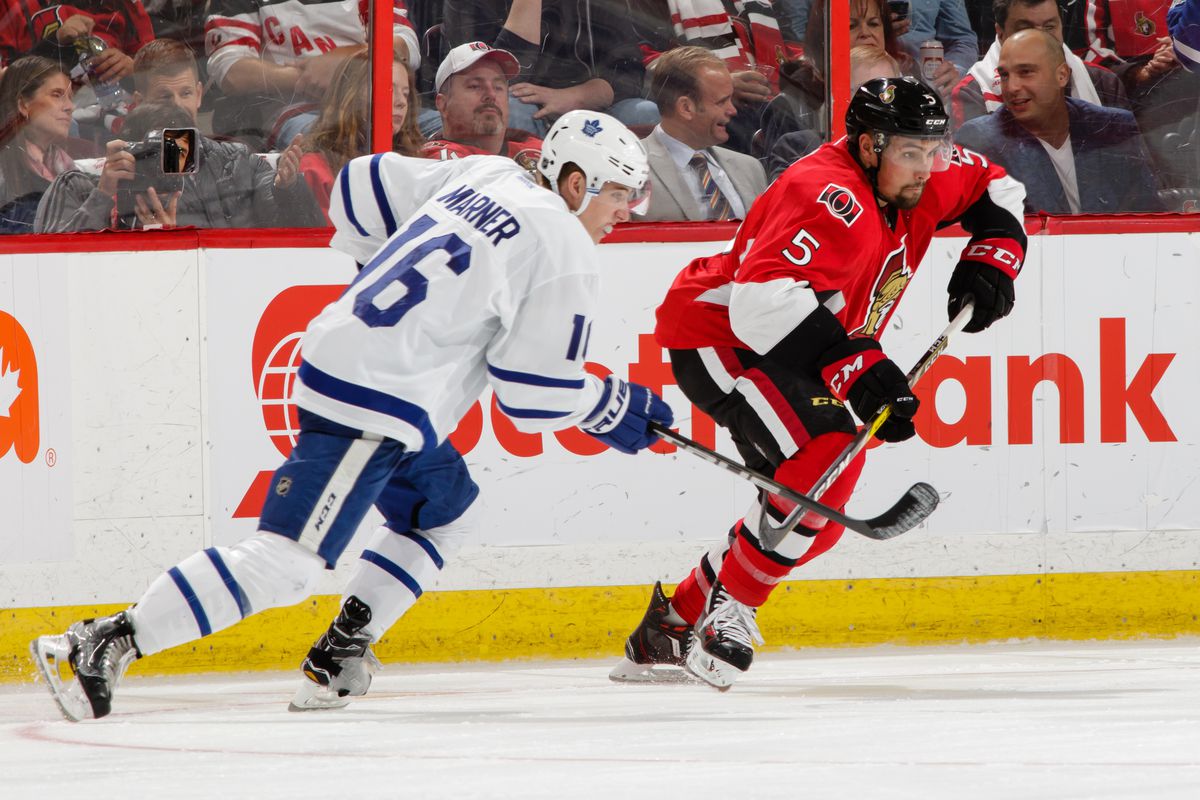
You’ve talked about wanting to improve the defense and wanting to improve in front of Frederik Andersen and that you owe it to him to tighten things up in front of him. Walk us through what you see. Cody Ceci was sometimes maligned in Ottawa for his defensive game. Tyson Barrie is great with the puck, but defense is maybe not known as the strength of his game, either. What do these two guys bring that you see that will help you guys be better not only with the puck but defending?
Dubas: With Cody, we went back and really studied him when Ottawa was making their run a few years ago. The last couple of years, part of it goes into the circumstances of him taking on really, really difficult assignments. When we looked at it, we said, “Okay, we can bring him in here and pair him with either Morgan or Jake or Travis Dermott when Travis Dermott is healthy, and have him with a partner that can really move the puck very effectively and efficiently. We know that he is a big, strong guy down low. We think we could make some improvements with him.
I’m sure Ottawa is hoping to do the same thing with Zaitsev and get better as they continue to grow. In Cody’s case, we just felt that for someone who is 24 and not yet 25 years old, we would be able to help him continue to grow and evolve. We liked a lot of things we saw within his game even going back a few seasons and we’re just trying to get him back on track. We feel he’s got a lot of incentive. He’s got an arbitration case ahead of him and one year before he hits free agency. We are excited about working with him and trying to make some gains with him.
Tyson — I know the reputation and you guys would’ve watched him a lot, but as a shooting, mobile, puck-carrying offensive guy, we like a lot of the things that we’ve seen defensively. We think he’s improved on that a lot over the years. He played with Muzzin before at the World Championships before in the past — it’s a very small sample, but they’ve had success in doing so. With his strength and how important of a year it is with him as well… Mike, Dave Hakstol and Paul McFarland will be on him about any of that, but the way I look at how we can best help Freddy and our group is to have a group of players — defense especially — that can get the puck and pass the puck to our forwards and get it out of our end so we don’t spend much time there.
In Tyson’s case as well, get up the ice and defend using his mobility and press right away versus backing in. Those are the types of things I think of when I think of them. It is not the traditional back-in and run guys in the defensive zone. We want guys who get the puck quickly and then transition quickly so we don’t spend much time there.
You were quoted saying you would love a lot of different things for the dynamic of your team, but you first and foremost put out skill. Naz is a guy who has some bite organically and maybe drags guys into a little bit of a war. When you look at it, Cody Ceci does have some heaviness and Ben Harpur does. When you look at the group, is it more that you are just comfortable with the skill set or do you believe it’s more about compete in certain aspects of the season and into the playoffs?
Dubas: It is a great question — one that we have certainly received, and I think rightfully so, a lot. I just think that as our guys continue to go through seasons and they accrue disappointments, and most of the guys have at the very least been here now for the three seasons and the three losses to Boston and Washington, they are going to learn the types of things it is going to take to be successful at that time of the year. Each of the last two years, especially this year — with the ability to win Game 6 at home against Boston and losing that one and going there — we were very close against a very competitive team. I think our guys are learning how to become more and more competitive.
I would love to have a group of guys that have that organic grit and nastiness to their game that also are great players, and I think we are just going to have to draft and develop those guys because they are very scarce on the marketplace. There are not a lot of them in the league that are always available. When you look at moving Naz out, there is no argument that he has that in spades and he brings that every single night. We think certainly Ceci plays hard and Harpur certainly plays very hard, but also Kerfoot plays extremely hard day in and day out. He’s very competitive as well. I think he is a younger guy in the league and maybe it’s not as overt as Naz was, but we think our group and our fan base and everybody will really like the way he plays in terms of grit and competitiveness night after night. We are excited about that.
I think we don’t forgo it. I have said and will continue to say that skill is always the number one criteria, but there are other parts like toughness — just in terms of competing for the puck and maintaining possession of the puck — that are very important to us as we are evaluating people and players as well.
On Mike Babcock’s input on trades
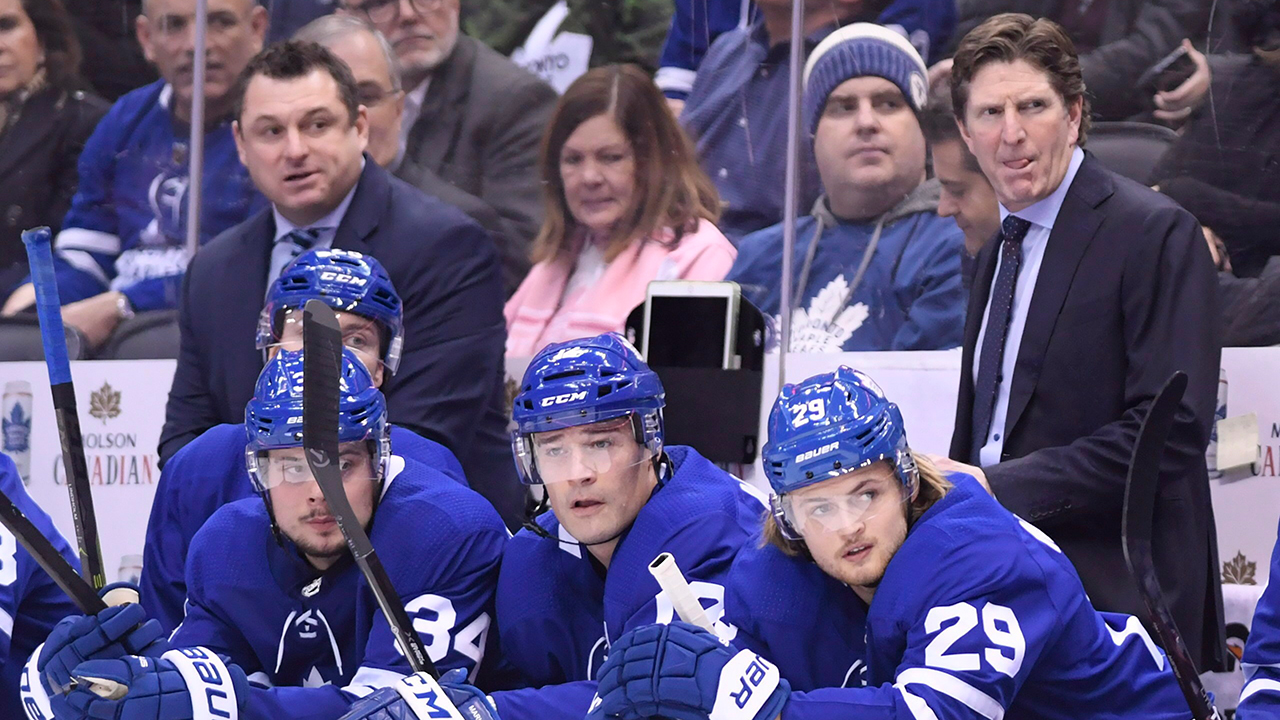
How much do you and your group consult with Mike Babcock and the coaches when you make a deal like the one with the Avs? Do the deals come first and then the discussion with the coaching staff happens afterward?
Dubas: I think there is always, in every sport, so many different ways of looking at it. Rightfully so, coaches are fixed on the short term. They are getting ready for the next practice or the next game or getting the team to the level that it needs to get to in terms of performance the next day or the next week. We sit up top or stand up top and work and are always keeping the long-term in mind.
When it comes to players who are going to impact the roster right away, I think it is only fair and ensures the player is going to have great success right away if the coaching staff has at least been consulted. I would say the coaching staff has been consulted in the same way that all other factions of the organization are — the player personnel department, your research and development and analytics department, your scouts, the various different pieces of information you can find out about a player from other spots in the organization. As the management team, after taking all that in, we have to decide.
That is essentially the way we operate here. We go through all the players that may be available or that we are talking about as free agents and then, in the end, I don’t think there has ever been one where every single person agrees on it save for few exceptions. I think that is part of the fun and the discussion of working in athletics — those times when there is a player that one faction really likes and another is not as high on it and going through and breaking down the player. It only increases your own knowledge of them and then it’s up to us in management to make the call at the end of what we think is best for the team.
If there was a player that Mike Babcock absolutely wanted to veto in either a trade or a free agent, would that be enough for you not to do it, even if you and your group believed that the player would be a good fit for the Leafs?
Dubas: I don’t know. It’s tough to answer because I don’t think that’s the relationship that Mike and I have. I don’t think either of us has ever said — whether it’s a player personnel or management situation or a coaching situation — that something is absolutely vetoed, but I think there are times, like in any coach or management situation, where one of you likes something better or worse than the other and you express that and go through it and try to work through it. I think, in the end, on the transaction and the signings and the trades, they’ve sort of tasked me and my group here to make those final calls.
If we thought we were going to bring a player in that one faction of our group really liked and everybody else really didn’t like, the other thing is, for the player coming in, you have to take into account what is it going to be like for the player knowing that there is just one person or one segment of the organization that really wanted them. It’s probably going to be really tough to get everyone else onside. That said, if there were a player that either I personally or someone in our personnel department felt really strongly about and were adamant about it, I think we would also take the chance that they could convince everybody else in time that the player has other skills that could bring the others onside.
On negotiations with Mitch Marner and the threat of an offer sheet
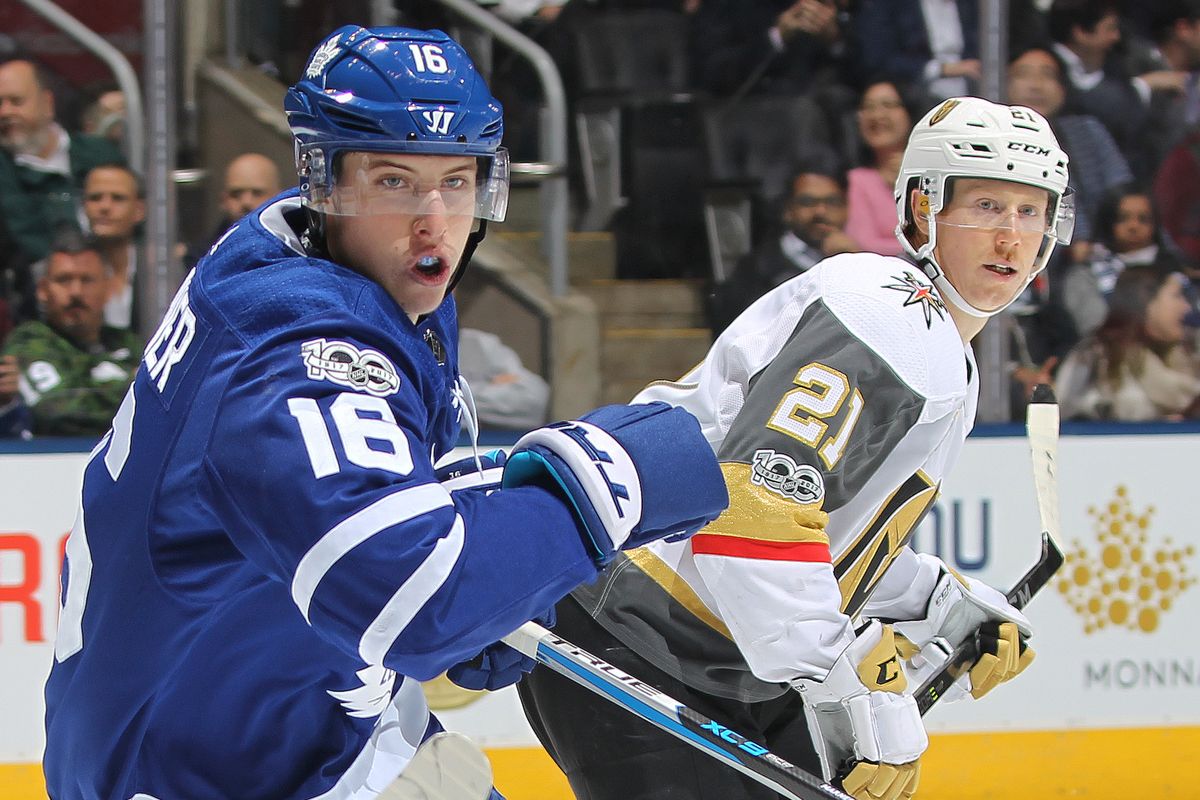
Have you had any substantive talks with Mitch Marner since your last update — which was yesterday?
Dubas: Darren and I continue to talk essentially daily. It has been a good process. He has been good to deal with. We’ll continue to work with him. It is a daily situation now. We are in touch everyday and we all want to get this to the conclusion we want to get to — ourselves, our fans, and everybody alike. The sooner we get to do that, the better for everybody. It would reduce a lot of anxiety on us all and have us all be able to move on and end any speculation or anything that may be going on and out there. That is our goal and we will continue to work on that and stay in touch with Darren and work with him towards a conclusion.
Do you schedule a meeting every day or is it the kind of thing where it’s, “If you have something new, get a hold of us?”
Dubas: I don’t know that we schedule a certain… It’s certainly not a standing appointment, but you talk and try to find a time each day to talk and kind of go through, even if it’s just reiterating the same stance that you’ve gone through plenty. These things can sort of get off the rails a little bit — just learning from past mistakes that personally I’ve made — when you just kind of wait a little bit too long. By staying in touch constantly, it serves as a major way to continue to have things progressing and moving forward. There is no standing appointment or set time each day, but I think daily — and sometimes multiple times per day — you are going back and forth and just trying to see where the other is at.
What was your reaction to Marner not receiving or signing an offer sheet yesterday?
Dubas: I don’t know if I have any real reaction. We continue to have discussion with Darren Ferris. As you saw yesterday, it is a possibility that there are teams, rightfully within the CBA, looking to improve their clubs via offer sheet. I don’t know if Carolina formally matched today, but I read they certainly said they would be. I am not surprised given the number of elite young players that are there that there are teams that would see that as an avenue to improve their team fairly quickly. With a young team like the player who was offer sheeted yesterday in Sebastian Aho or some of these other restricted free agents, I wouldn’t be surprised if there were more this year or in the future.
For us, we are trying to go about our business. If it happens, it happens. We are hopeful we can continue working with Darren and Mitch and get that done and have Mitch here for a long time.
With respect to Aho and the offer sheet and the group of RFAs you mentioned, does Aho signing that offer sheet and establishing a value impact the rest of the group in the league-wide marketplace?
Dubas: I think yeah. With this number of guys who have all had success this early in their careers… The forwards get talked about a lot but there are also defensemen that out there and in this situation. I think everyone kind of looks around and adds to the comparable list of people that are signing. The players, or their agents, or even internally here, we’ll look at the points and all the different things you can use to compare the players, whether it’s time on ice — everything, top to bottom. Before Meier and Aho signed yesterday, it seemed like we didn’t know if anything was going to start to get done, but we are obviously hopeful it can start to shake some things loose and help us on our end as well.
On possible other moves this offseason and betting on internal improvements
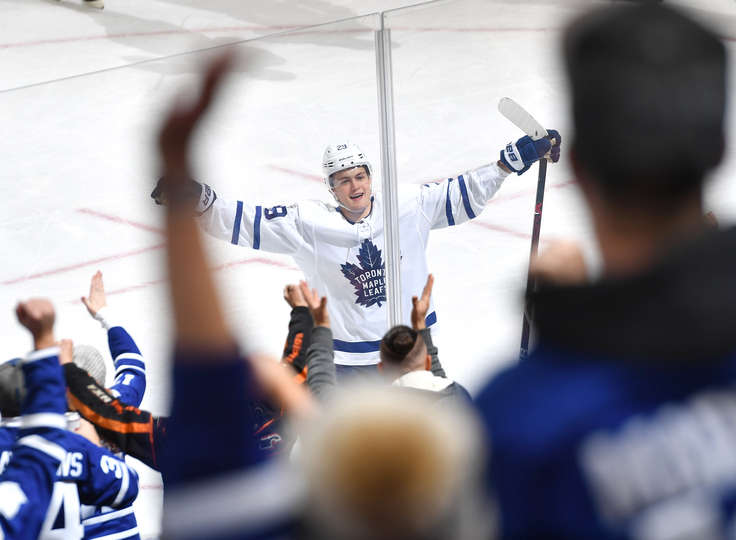
When you look at this year’s team compared to last year’s team, how do you view it in terms of strengths and weaknesses? What do you like and what do you think is an area you still may need to address?
Dubas: I think a lot of the stuff we are hoping to address… We just hope that it comes from the continued maturation and growth of the young core. I know Garret Sparks is the longest-serving member of the organization — drafted in 2011 — but Morgan is now the longest-serving member of our Leafs team in terms of the amount of time he’s spent on the big club in the NHL. I think our hope is that Morgan is just 25 years old. When you look at the core of our group and you take Jason Spezza out, you’ve got Jake Muzzin and John Tavares and they’re 30 and well below 30 yet in terms of age. I think that means our group has a lot of room to grow.
Our forwards, whether it’s Auston or Mitch, even though they’ve had excellent starts to their careers, they are only going to continue to improve and grow and get better. We are trying to build an environment where we can help our young players reach their potential. I think William Nylander is going to have a much different season, of course, than he had last year. That is partly to do with us and getting the contract done, but he’ll be able to ramp up right from the beginning, which I think will allow him to get back on the track he was on and continue to improve. I think we are expecting our team to continue to make big gains internally as we go through the year and then hopefully get those improvements from within, but if we need to address something during the year, it’s just maintaining our flexibility to do that.
How much of your team’s improvement — what you are trying to do year over year — will come from your core young players getting better? That is part of the plan — not just changing the personnel, but the guys that are going to be back year over year have to get better. How much is that part of the plan, that those guys just entering the prime of their careers will be better?
Dubas: That is a major part of it. It is a key topic of conversation internally — not just how much they can get better, but what we can we do here internally to help those players get better every single season. What are we doing on the development side in terms of the strength and conditioning of those players, in terms of their ability to understand and execute the system, their technical skills. We want players that are going to put the effort in, but we are also going to have to match that with what we offer each season and really continue to develop them.
Speaking particularly, even bringing Morgan into this — he is only 25 years old — you have between Morgan and Auston and Mitch and Willy, all the way through to your Johnssons, Kapanens and Dermotts, etc, we can’t just count on their continued improvements and evolution. We need them to continually develop and improve. One of the great benefits we have here in having John Tavares is that he is someone who is 28 years old now and is obviously a proven mult-time All Star in the league, but he is always continuing to find ways to improve and push himself. I think that is a major, major help to our younger guys as they continue to evolve and grow.
We are counting on those guys as they edge towards 23, 24, 25, 26 years old to continue to work towards their vast potential. That is one part that I always kind of stress internally and in talking to media and fans. Those players have high talent and ability and they’re not close to their potential yet. As they gain experience and go through various successes and disappointments, their potential is only going to be closer to being reached, but we are not close to there yet.
What is the likelihood of you dealing away any additional pieces prior to the start of the season?
Dubas: We like where we are at as of right now. We obviously have some contractual matters to take care of — notably Mitch, but now Cody Ceci and Alex Kerfoot. The majority of our focus is on versatile depth pieces up front and on the backend that can kind of complement what we have and give Mike and the coaching staff as many looks and options as possible heading into training camp and exhibition and let the guys sort it out there.
But you never say never. I certainly never expected that we would be talking today and Nazem Kadri was not a member of our team. You never know. But at this point, I don’t see anything imminent or overly likely for the rest of the offseason. Today, we feel pretty good about it, but the drive to continue to improve it is always there. I don’t know that it is super likely that we will have any more major transactions in the way of trade.
On whether Kawhi Leonard will stay in Toronto
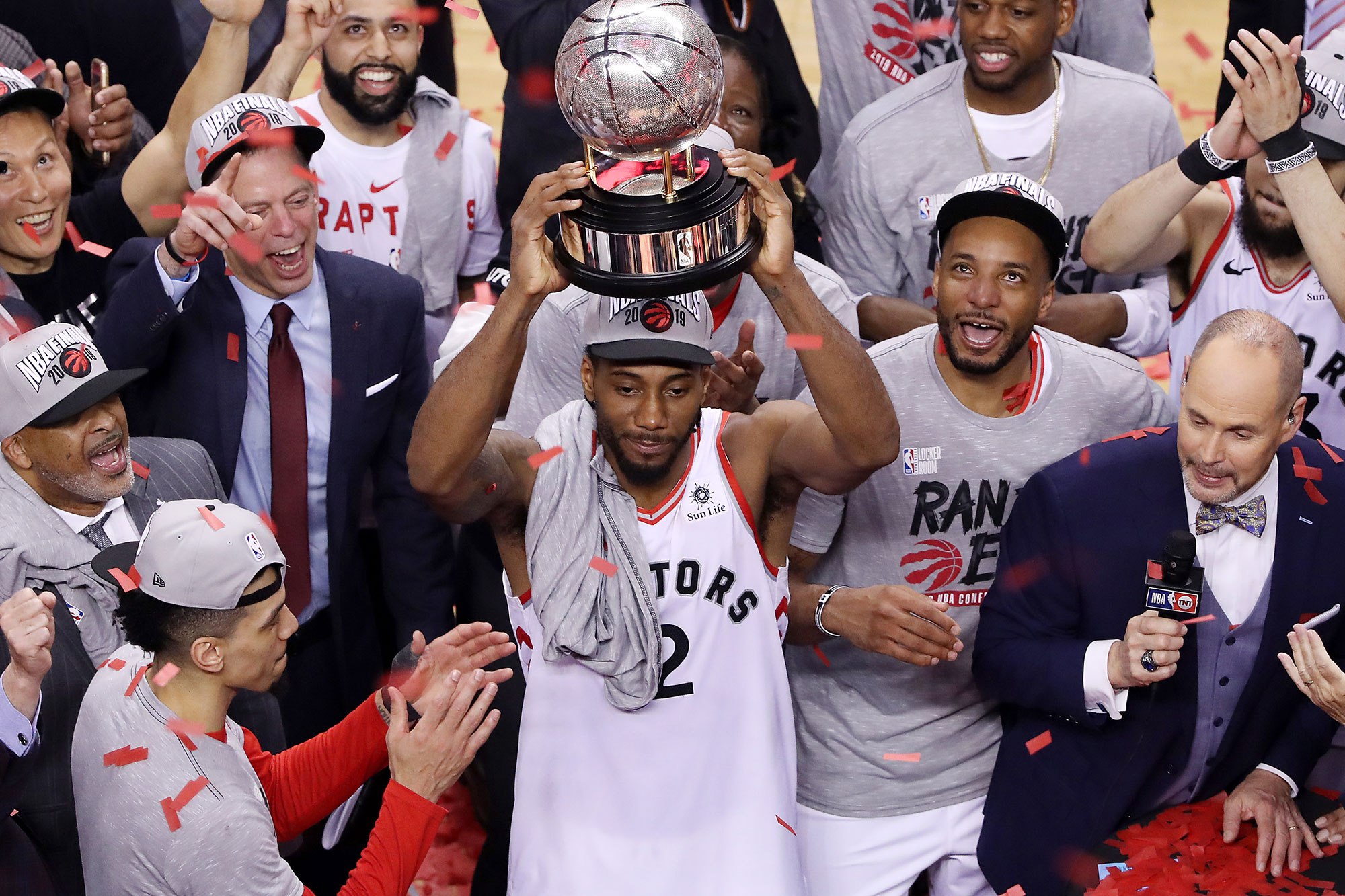
Will your good buddy Masai sign Kawhi Leonard?
Dubas: I am optimistic. It’s tough. One day, it’s he’s definitely going to be back and another day it is definitely not and he’s going to a litany of other teams. In these things, it is so interesting because last year with the Tavares situation, you kind of know what’s happening on the outside and you’re able to kind of laugh as some of the outside speculation…. I guess Mike Babcock’s situation coming here was the other, where in both cases they were definitely going to go elsewhere, they were going to stay where they were, or they were going to go to a different team and we were kind of out. We knew that wasn’t really the case.
Having gone through those things, it sort of lets you block out the outside noise or speculation about where the player or coach or manager is going to end up. But I am optimistic. I think it is such a great program, the Raptors. The fan base and the way everybody got behind the team — I just think it is such a great fit for any player to be a Toronto Raptor. I could never understand why anybody would not want to play here. It is a great city and a unique opportunity with the NBA being in Canada. I think all of the players on that team certainly experienced it.
Notwithstanding whatever Kawhi’s decision is, I am certain we know it is a place that is going to be able to draw star players for a long time and be a team that will contend and win for a long time.



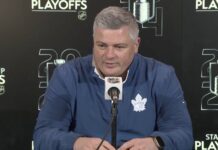
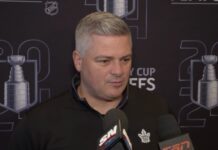
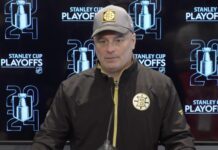

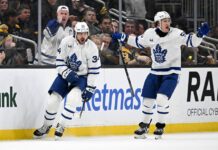

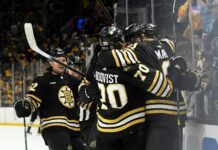
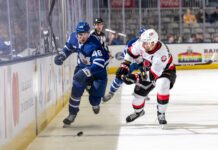


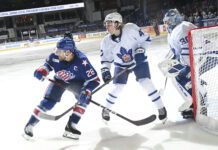











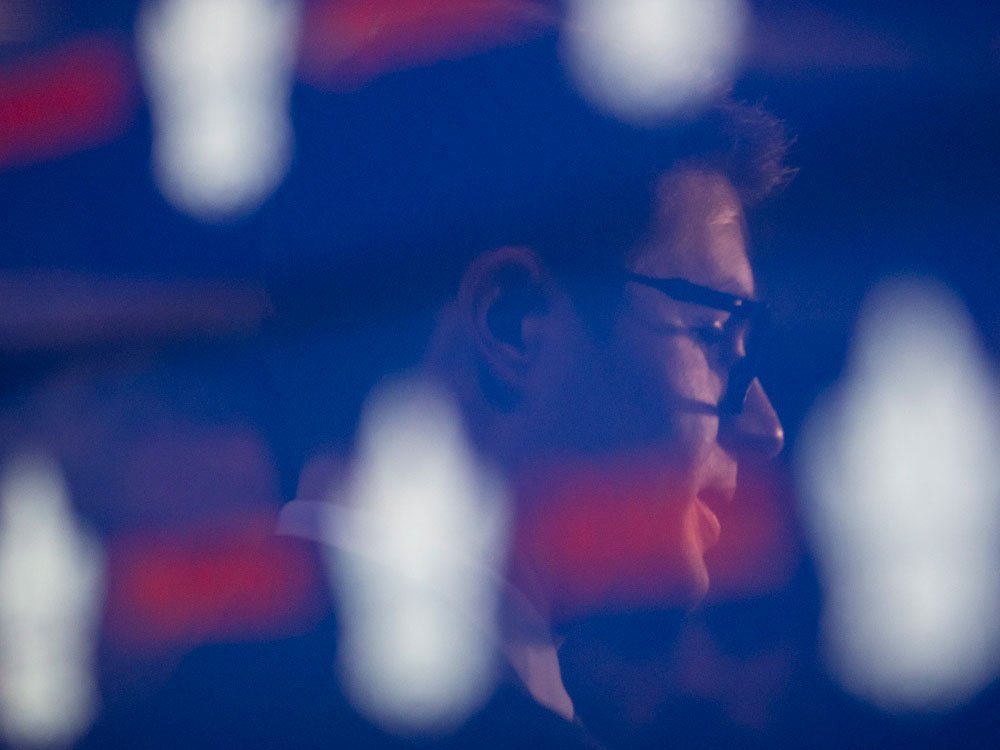
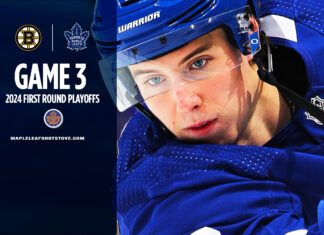






![Sheldon Keefe Post Game, Leafs 3 vs. Bruins 2: “I loved [the Matthews] line, and I loved a lot about our game all the way through the lineup” Sheldon Keefe, Toronto Maple Leafs post game](https://mapleleafshotstove.com/wp-content/uploads/2024/04/keefe-pg-game-1-100x70.jpg)

